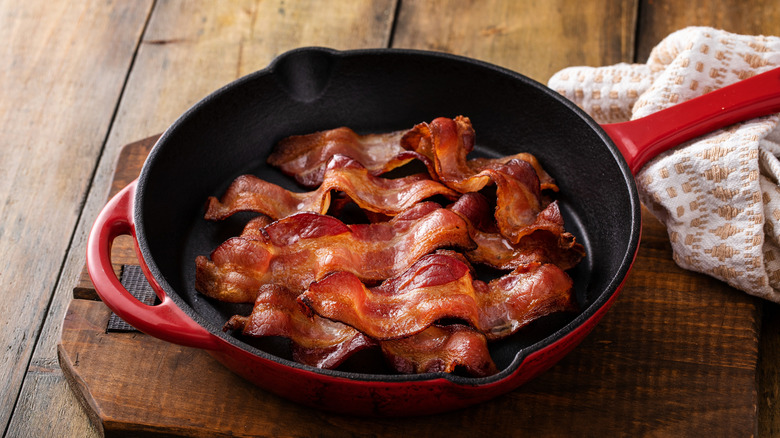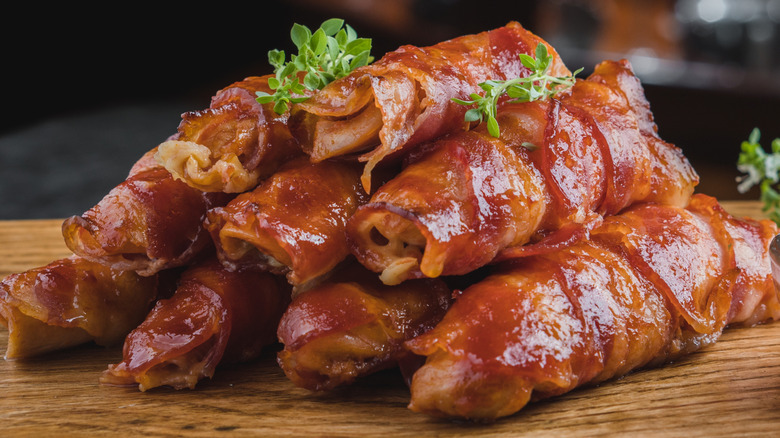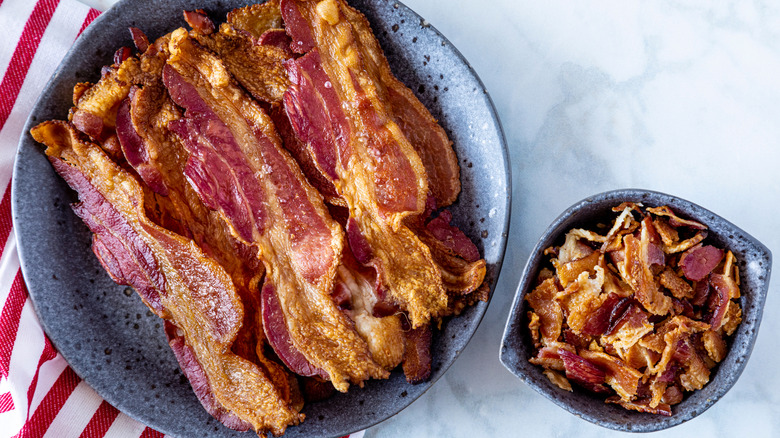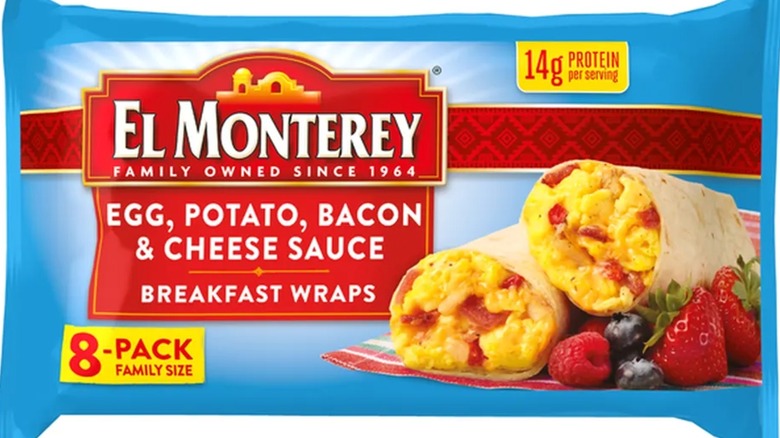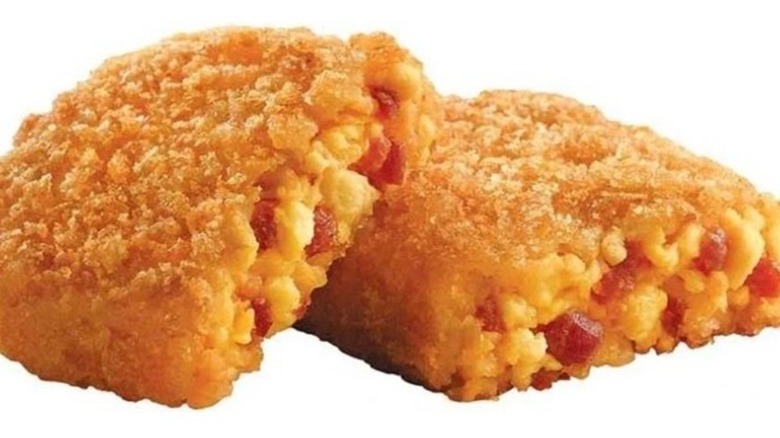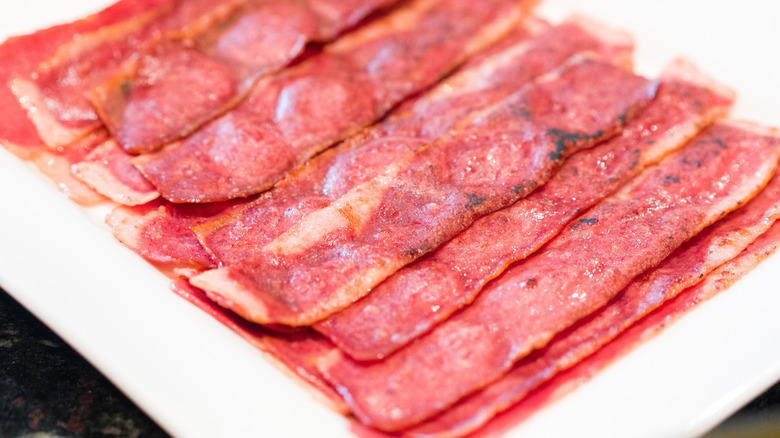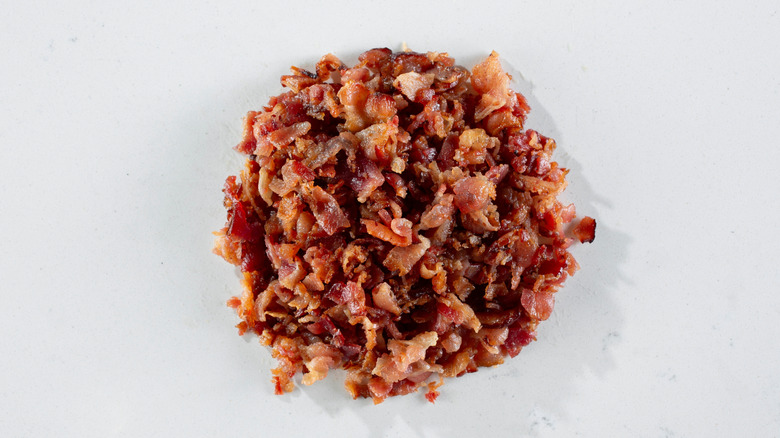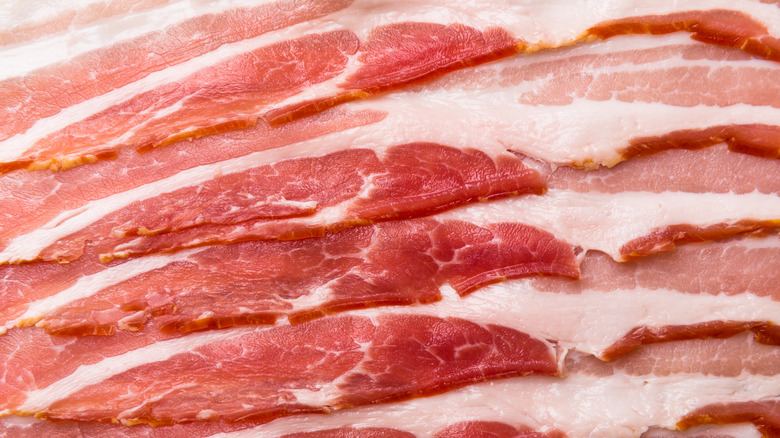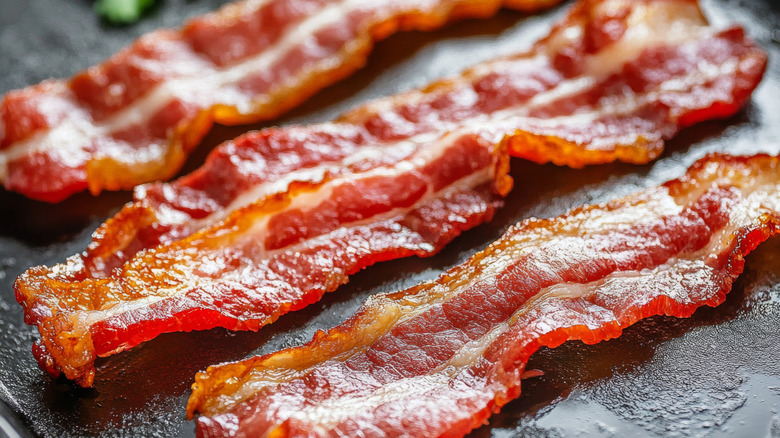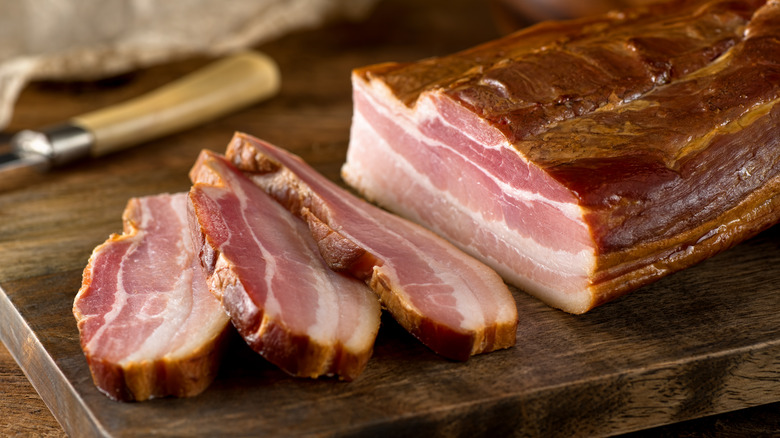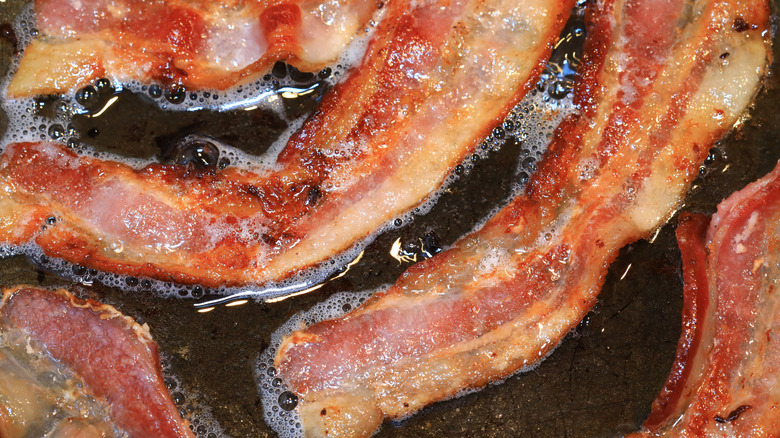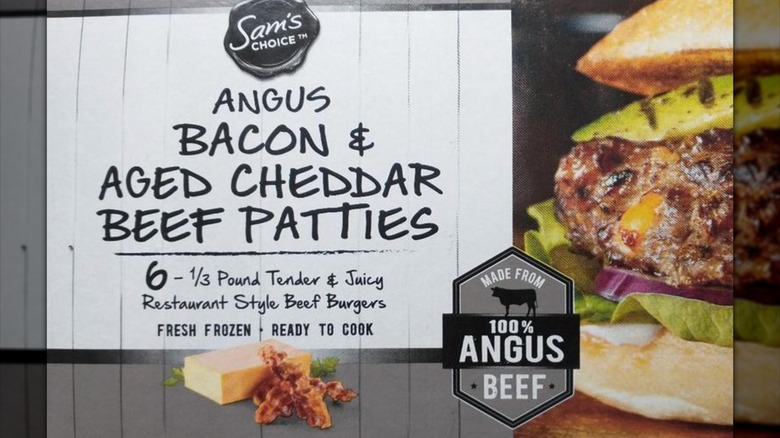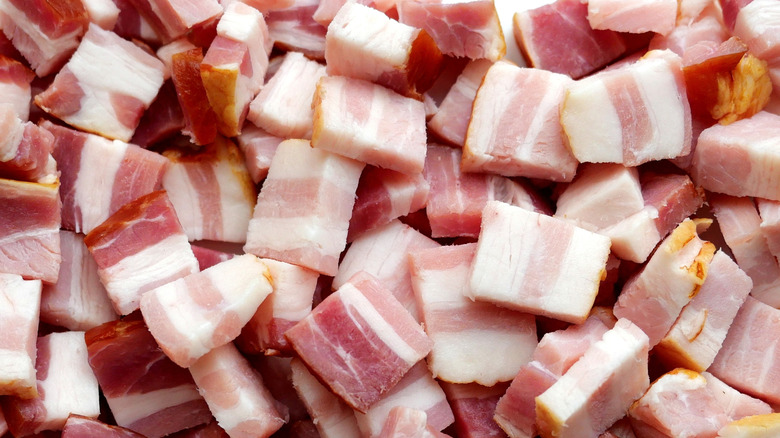The Biggest Bacon Product Recalls In The US
Bacon is a big deal in the U.S. In fact, in 2020, research suggests that more than 268 million Americans consumed bacon in some format. The cut of processed meat is popular for a few reasons — it's a little sweet, pretty salty, and it's pleasantly crispy, too. It's also incredibly versatile. It can be fried or baked, served with eggs or grilled cheese, wrapped around chicken or scallops, or slapped in a cheeseburger.
But like many foods, bacon has some drawbacks. For one, it's processed meat, which means it comes with some serious health risks. According to the World Health Organization, it's a Group 1 carcinogen, which means it is known to cause cancer. On top of this, bacon products have also been caught up in a few major recalls over the years. Sometimes, bacon products are pulled from the market because they contain undeclared allergens, for example. Other items, it's because they contain metal, plastic, or even small rocks. On rare occasions, it's due to a risk of deadly foodborne bacteria making its way into the food supply.
But don't worry. If you're concerned about the safety of your bacon products, the Food Safety and Investigation Service (FSIS) is often quick to recall products from the market if they pose a risk. Intrigued? Find out more about some of the biggest bacon product recalls of the last few decades below.
More than 489,000 pounds of sausage and bacon breakfast sandwiches recalled due to undeclared sesame (2025)
Breakfast sandwiches are a go-to for many Americans. In fact, research suggests that when it comes to the first meal of the day, around 45% of people in the U.S. say that a breakfast sandwich, usually loaded with ingredients like eggs, bacon, and sausages, is one of their favorites. But sometimes, unfortunately, things go wrong with prepackaged breakfast sandwiches. At the beginning of April 2025, Utah-based manufacturer Hearthside Food Solutions had to issue a recall for more than 489,000 pounds of breakfast sandwiches because they contained undeclared sesame, a common allergen.
Two types of prepared sandwiches were implicated in the recall, and both were sold under the Lettieri's brand. They were: Lettieri's Food to Go Bacon, Egg and Cheese French Toast Breakfast Sandwich, and Lettieri's Food to Go Sausage, Egg and Cheese French Toast Breakfast Sandwich. The issue was linked to the French toast used in the bacon and sausage sandwiches, which contained sesame flour, but this was not listed in the ingredients.
At the time of the recall, the sandwiches had already been sent to Army and Air Force Exchange Services across the U.S. Luckily, despite the fact that sesame is in the top nine most common allergens in the U.S., no reactions were reported as a result of the labeling error.
Custom Made Meals recalled more than 1,300 pounds of bacon-wrapped chicken due to undeclared milk (2023)
Sesame isn't the only allergen that can sneak its way into bacon products. In 2023, Custom Made Meals, a manufacturer based in Colorado, had to recall more than 1,300 pounds of bacon-wrapped chicken breasts because they contained undeclared milk. This means they were a health risk to anyone in the U.S. with an allergy to cow's milk. Research suggests that almost 2% of American children suffer from a milk allergy.
In this instance, the problem was due to a labeling mix-up. The products, which were Bacon-Wrapped BBQ Seasoned Chicken Grillers, had been packaged with the wrong labels. This meant that the ingredients list on the back of the product was incorrect. Luckily, nobody reported any allergic reactions as a result of eating the bacon-wrapped chicken, even though it had already been sent to retailers in Alabama, Arkansas, Texas, Louisiana, Georgia, and Missouri.
Smithfield recalled more than 185,600 pounds of bacon toppings due to fears over metal contamination (2022)
Bacon bits are often used in everything from creamy pasta dishes to hearty soups, but one thing you definitely don't want to discover in your bacon dinner is a piece of metal. Unfortunately, that's what happened to one person after they purchased a bacon topping produced by the meat giant Smithfield. After they sent a complaint to the company, Smithfield was forced to recall more than 185,600 pounds of bacon topping (which had already been sent to retailers nationwide).
The affected products included Golden Crisp Patrick Cudahy Precooked Bacon Topping, Smithfield Precooked Bacon Topping, and Member's Mark Fully Cooked Bacon Crumbles. Luckily, nobody was injured by any metal pieces, which may have found their way into the product via broken machinery in the factory where it was produced. If a person accidentally bites down on a piece of metal, they could end up with oral or teeth injuries. If they swallow it, they could even end up with internal cuts.
In an abundance of caution, the FSIS urged anyone who had already bought any of the bacon products listed in the recall not to consume them. Instead, they were encouraged to throw them away or return them to the store for a refund.
More than 246,000 pounds of frozen bacon breakfast wraps over concerns they contained small rocks (2019)
Another thing you don't want in your favorite bacon product? Small rocks. But unfortunately, in 2019, three El Monterey customers were not spared from this reality. The consumers had purchased the brand's Egg, Potato, Bacon and Cheese Sauce Breakfast Wraps, but were surprised to discover small rocks inside. One person even reported a potential injury as a result of consuming the breakfast wraps. As a result, the manufacturer of the wraps, Ruiz Foods, recalled more than 246,000 pounds of the product from shelves across the U.S.
It was unknown exactly how the small rocks found their way into the breakfast wraps, but it could have been due to contamination in the factory where they were produced. Once again, like metal, eating a small rock by accident can cause serious harm. It's a choking hazard, for one, and it could also cause dental, mouth, or internal injuries. Fortunately, there were no further reports of any injuries associated with the El Monterey wraps.
Les Chateaux De France recalled more than 4,200 pounds of bacon-wrapped scallops due to undeclared milk (2017)
Scallops are a popular seafood in the U.S. They can be prepared in many ways, from Alfredo pasta to frutti de mare, but they are also frequently enjoyed wrapped in bacon. However, in 2017, consumers were put at risk from this favorite seafood dish, when New York brand Les Châteaux De France sent more than 4,200 pounds of bacon-wrapped scallops to institutional locations in five states (New York, New Jersey, Delaware, Florida, and Pennsylvania) that contained undeclared milk. As mentioned earlier, this was a major risk, because milk is one of the top nine allergens in the U.S.
The problem was discovered during an FSIS food safety assessment, and it was this that prompted the recall. Fortunately, there were no confirmed allergic reactions to the bacon-wrapped scallops. However, anyone who was concerned was urged to not consume the product.
McCain Foods recalled more than 25,200 pounds of bacon fritters due to potential plastic contamination (2016)
Nobody wants a foreign object in their food, but unfortunately, it does happen. Metal and small rocks are two examples of common unwanted materials in the food supply, but neither are as common as plastic fragments. In fact, plastic pieces are the most common foreign object that people find in their food. The material, which, again, often finds its way into products during the manufacturing process, was the cause of a 2016 McCain Foods recall.
The brand was forced to pull more than 25,200 pounds of its McCain Early Risers Potato, Egg, Cheese, and Bacon Fritters. The products that are made for schools were recalled from food service distributors in 12 states after receiving a complaint from a consumer who had discovered a piece of plastic inside one of the fritters. Accidentally consuming plastic fragments comes with many risks, including choking and cuts. Luckily, nobody reported any injuries as a result of consuming the fritters.
Kraft Heinz recalled more than 2 million pounds of turkey bacon due to fears it could spoil before the use-by date (2015)
Turkey bacon is often considered to be the healthier alternative to pork bacon, but it still comes with its own set of risks. It's still made with potentially harmful preservatives, for example, and it contains sodium and cholesterol. It's also not immune from a recall. In 2015, for example, food giant Kraft Heinz had to recall more than 2 million pounds of turkey bacon sold under the Oscar Mayer brand due to fears the products could spoil before the best before date.
At the time of the recall, the products, which included uncured and cured bacon products from Oscar Mayer, had already been sent not just across the U.S., but also to retailers in the Bahamas and St. Martin. The issue was discovered by consumers, who realized the turkey bacon was spoiled before its best before date. Eating spoiled meat comes with a higher risk of foodborne illness, and unfortunately, in this instance, some people did get sick from eating the recalled product.
More than 30,600 pounds of bacon bits recalled due to an undeclared allergen (2015)
As well as sesame and milk, soy is another top allergen in the U.S. Soy allergies are more common in children, but they do affect adults, too. In rare cases, products with soy could lead to life-threatening anaphylaxis if consumed by someone with an allergy. This is why, in 2015, Ohio company L&L Foods had to recall more than 30,600 pounds of bacon bits from manufacturers in Ohio and North Carolina. The products had been contaminated with soy lecithin, which is a food additive made from soy, during production. However, the allergen was not declared on the packaging.
The uncured bacon bits were supposed to be used in salad kit products, but fortunately, the packaging error was discovered during an FSIS inspection of the L&L Foods product labels. There were no reports of any allergic reactions associated with the bacon bits.
DaBecca Natural Foods recalled more than 3,400 pounds of apple smoked bacon due to misbranding (2014)
Not all packaging errors are associated with allergens. In 2014, Chicago-based company DaBecca Natural Foods had to recall more than 3,400 pounds of its Sliced Uncured Apple Smoked Bacon from institutional distributors in California and Texas. This was because the products were shipped out in packaging that did not have the USDA mark of inspection on the label.
The USDA mark of inspection is important — its purpose is to assure consumers that the meat product they are consuming has been thoroughly inspected and is safe to eat. For that reason, it should always be easy to find on product packaging. If a meat product is not appropriately inspected, there is no guarantee that it was produced in a safe, hygienic facility.
The packaging error was discovered during an FSIS inspection of the DaBecca Natural Foods facility. There were no reports of any health issues associated with the misbranded products.
More than 80,000 pounds of hickory smoked sliced bacon recalled due to misbranding (2014)
Sodium nitrite is a common food preservative, often found in meat products. It's used to help the food last longer, and reduce the growth of bacteria, like Clostridium botulinum, for example (which is the cause of botulism, a serious foodborne illness). On top of this, in bacon, it can also help to enhance taste and color. It's not without risks — sodium nitrite is also associated with an increased risk of cancer and heart disease.
It's vital that foods with sodium nitrite are labeled accurately, so consumers can make informed decisions. In 2014, Abe's Finest Meats was forced to recall more than 80,000 pounds of hickory smoked sliced bacon, sold under the Cedar Creek brand name, because sodium nitrite was not listed on the packaging. At the time of the recall, the sliced bacon products had already been sent to distributors in two states: Florida and Georgia. There were no consumer health complaints associated with the recall.
More than 3,600 pounds of slab bacon recalled due to an undeclared allergen (2014)
In 2014, Michigan company Dearborn Sausage also had to issue a recall after a routine assessment conducted by the FSIS. As with L&L Foods, a packaging error meant that one of its products, Randy's Slab Bacon, had been sold with the wrong labeling. This meant that soy, an allergen, was not declared on the product, and resulted in a recall of more than 3,600 pounds of product.
Fortunately, the issue was only related to one retailer, which was selling the same product from Dearborn Sausage as both slab bacon and sliced bacon. The sliced bacon version had the wrong label, and did not appropriately list hydrolyzed soy protein, which is a common food additive derived from soybeans. There were no reports of ill effects or allergic reactions associated with the mislabeled bacon, but anyone who was concerned about experiencing any health-related problems was urged to contact their healthcare provider.
Transatlantic Foods recalled around 220,000 pounds of pork and chicken products, including multiple uncured bacon products, due to a lack of inspection (2014)
The FSIS is in place to keep the food system as safe as possible. Every facility that processes animal products, including bacon, needs to be inspected to ensure that regulations are followed properly, and food products are produced in hygienic, clean environments. However, sometimes, brands slip through the net. This is what happened in 2014, when New York company Transatlantic Foods shipped more than 220,000 pounds of meat products, including uncured bacon, to retailers across the country without the appropriate inspections taking place.
After receiving an anonymous tip, the FSIS discovered that Transatlantic Foods was manufacturing products in a facility that did not have an official Grant of Inspection. This means that consumers were at risk of potentially eating meat produced in an unsafe environment. Fortunately, a recall was issued, and there were no reports of illness associated with the uninspected products.
Around 37,600 pounds of bacon cheeseburgers recalled due to foreign material contamination (2012)
There are three things you want in a bacon cheeseburger: bacon, beef, and cheese. One thing you certainly don't want? A piece of gasket. Unfortunately for one consumer, this is what they found when they opened up a pack of Sam's Choice Fireside Gourmet Angus Beef Patties with Bacon and Aged Cheddar. The products had been produced by Kenosha Beef International, a Wisconsin-based company, and the gasket piece likely broke off during manufacturing and embedded itself in the product.
Fortunately, the consumer did not experience any injuries as a result of the contamination, and there were no reports of anyone else finding any foreign objects in the products. However, to be on the safe side, a recall was issued for more than 37,600 pounds of bacon cheeseburgers, which had already been shipped to Indiana, Maine, North Carolina, Ohio, Pennsylvania, South Carolina, and Wisconsin.
Around 380,000 pounds of diced bacon recalled amid listeria concerns (2011)
Regular inspections are carried out by the FSIS to stop foodborne bacteria from contaminating the food supply and causing dangerous outbreaks of foodborne diseases. However, sometimes, they still get through. In 2011, routine testing at a Canadian facility, operated by a company called Ailments Prince, discovered listeria, a harmful foodborne bacteria. Unfortunately, bacon products produced at this facility, including Napoli Cooked Bacon Topping and Stefano Brand Cooked Diced Bacon, had already been shipped to distribution centers in the U.S.
The affected products were supposed to be sent on to foodservice locations, but the discovery resulted in a recall of more than 380,000 pounds of bacon products. Fortunately, while listeria bacteria can lead to an illness called listeriosis (which can be life-threatening for vulnerable individuals, particularly the elderly and the very young), there were no reports of health problems associated with the recalled products.
